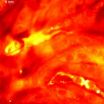(Press-News.org) Researchers from the National Cancer Institute report that decaffeinated coffee drinking may benefit liver health. Results of the study published in Hepatology, a journal of the American Association for the Study of Liver Diseases, show that higher coffee consumption, regardless of caffeine content, was linked to lower levels of abnormal liver enzymes. This suggests that chemical compounds in coffee other than caffeine may help protect the liver.
Coffee consumption is highly prevalent with more than half of all Americans over 18 drinking on average three cups each day according to a 2010 report from the National Coffee Association. Moreover, the International Coffee Association reports that coffee consumption has increased one percent each year since the 1980s, increasing to two percent in recent years. Previous studies found that coffee consumption may help lower the risk of developing diabetes, cardiovascular disease, non-alcoholic fatty liver disease, cirrhosis, and liver cancer.
"Prior research found that drinking coffee may have a possible protective effect on the liver. However, the evidence is not clear if that benefit may extend to decaffeinated coffee," explains lead researcher Dr. Qian Xiao from the National Cancer Institute in Bethesda, Maryland.
For the present study researchers used data from the U.S. National Health and Nutrition Examination Survey (NHANES, 1999-2010). The study population included 27,793 participants, 20 years of age or older, who provided coffee intake in a 24-hour period. The team measured blood levels of several markers of liver function, including aminotransferase (ALT), aminotransferase (AST), alkaline phosphatase (ALP) and gamma glutamyl transaminase (GGT) to determine liver health.
Participants who reported drinking three or more cups of coffee per day had lower levels of ALT, AST, ALP and GGT compared to those not consuming any coffee. Researchers also found low levels of these liver enzymes in participants drinking only decaffeinated coffee.
Dr. Xiao concludes, "Our findings link total and decaffeinated coffee intake to lower liver enzyme levels. These data suggest that ingredients in coffee, other than caffeine, may promote liver health. Further studies are needed to identify these components."
INFORMATION:
This study is published in Hepatology. Media wishing to receive a PDF of this articles may contact sciencenewsroom@wiley.com
Full citation: "Inverse associations of total and decaffeinated coffee with liver enzyme levels in NHANES 1999-2010." Qian Xiao, Rashmi Sinha, Barry I. Graubard and Neal D. Freedman. Hepatology; (DOI: 10.1002/hep.27367).
URL: http://doi.wiley.com/10.1002/hep.27367
Author Contact: Media wishing to speak with Dr. Xiao may contact the NCI press office at ncipressofficers@mail.nih.gov.
Media Advisory
The Liver Meeting® 2014
Founded in 1950, AASLD is the leading organization of scientists and healthcare professionals committed to preventing and curing liver disease. AASLD has grown into an international society responsible for all aspects of hepatology, and the annual meeting attracts 10,000 physicians, surgeons, researchers, and allied health professionals from around the world.
The Liver Meeting® is the premier meeting in the science and practice of hepatology, including the latest findings on new drugs, novel treatments, and the results from pilot and multicenter studies.
When: November 7 - 11, 2014
Where: Hynes Convention Center in Boston, Massachusetts
Contact: Please go to https://www.xpressreg.net/register/asld114/media/reginfo.asp to obtain a press pass for this event.
About the Journal
Hepatology is the premier publication in the field of liver disease, publishing original, peer-reviewed articles concerning all aspects of liver structure, function and disease. Each month, the distinguished Editorial Board monitors and selects only the best articles on subjects such as immunology, chronic hepatitis, viral hepatitis, cirrhosis, genetic and metabolic liver diseases and their complications, liver cancer, and drug metabolism. Hepatology is published on is published by Wiley on behalf of the American Association for the Study of Liver Diseases (AASLD). For more information, please visit http://wileyonlinelibrary.com/journal/hep.
About Wiley
Wiley is a global provider of content-enabled solutions that improve outcomes in research, education, and professional practice. Our core businesses produce scientific, technical, medical, and scholarly journals, reference works, books, database services, and advertising; professional books, subscription products, certification and training services and online applications; and education content and services including integrated online teaching and learning resources for undergraduate and graduate students and lifelong learners.
Founded in 1807, John Wiley & Sons, Inc. (NYSE: JWa, JWb), has been a valued source of information and understanding for more than 200 years, helping people around the world meet their needs and fulfill their aspirations. Wiley and its acquired companies have published the works of more than 450 Nobel laureates in all categories: Literature, Economics, Physiology or Medicine, Physics, Chemistry, and Peace. Wiley's global headquarters are located in Hoboken, New Jersey, with operations in the U.S., Europe, Asia, Canada, and Australia. The Company's website can be accessed at http://www.wiley.com.
Drinking decaf coffee maybe good for the liver
2014-10-09
ELSE PRESS RELEASES FROM THIS DATE:
Cellular 'power grid' failure triggers abnormal heart rhythms after a heart attack
2014-10-09
VIDEO:
The 'heart attack in a dish' experiment reveals that the mitochondria--or cellular powerhouses--of heart muscle cells flicker and oscillate following heart attack and disrupt the heart's entire electrical system...
Click here for more information.
Heart attack survivors often experience dangerous heart rhythm disturbances during treatment designed to restore blood flow to the injured heart muscle, a common and confounding complication of an otherwise lifesaving intervention. ...
The mathematics behind the Ebola epidemic
2014-10-09
This news release is available in German. The Ebola epidemic in West Africa appears to be spiralling out of control. More than ever, local and global health authorities want to know how the epidemic will develop and, above all, how to prevent it from spreading further. Certain parameters help them to determine this, such as the reproductive number, which is the average number of infections caused by a single infected individual. The incubation and infectious periods are also highly relevant; i.e. the time from infection to the onset of symptoms and the time from onset ...
New increase in antimicrobial use in animals in Denmark
2014-10-09
Antimicrobial usage in animals in Denmark continued to increase in 2013 – mainly due to an increased use in pigs. However, antimicrobial use in pigs is still 12% lower than in 2009. In general, livestock received very little of the critically important antimicrobials, which are used to treat humans. These findings appear in the annual DANMAP report from Statens Serum Institut and the National Food Institute, Technical University of Denmark. DANMAP is the Danish integrated antimicrobial resistance monitoring and research programme.
In 2013, the total use of antimicrobials ...
Climate change alters the ecological impacts of seasons
2014-10-09
This news release is available in German. Only recently, the UN Climate Summit came together in New York to further address the necessary measures to protect the Earth from a dramatic climate change. It has long been recognised that an increase of the average temperature will cause rising oceans and thus flooded landscapes. Particularly, regions close to the coasts are endangered. While it is well known that climate change has increased average temperatures, it is less clear how temperature variability has altered with climate change.
Postdoctoral fellow George Wang, ...
Intracranial stents: More strokes than with drug treatment alone
2014-10-09
The risk of having another stroke is higher if patients, after dilation of their blood vessels in the brain, not only receive clot-inhibiting drugs, but also have small tubes called stents inserted. However, studies have provided no hint of a benefit from stenting, which is also referred to with the abbreviation "PTAS". This is the conclusion reached in the rapid report of the German Institute for Quality and Efficiency in Health Care (IQWiG), as published on 9 October 2014.
Stents are supposed to prevent restenosis
Blood vessels in the brain that are narrowed or blocked ...
Nanoparticle research could enhance drug delivery through skin
2014-10-09
Scientists at the University of Southampton have identified key characteristics that enhance a nanoparticle's ability to penetrate skin, in a milestone study which could have major implications for the delivery of drugs.
Nanoparticles are up to 100,000 times smaller than the thickness of a human hair and drugs delivered using them as a platform, can be more concentrated, targeted and efficient than those delivered through traditional means.
Although previous studies have shown that nanoparticles interact with the skin, conditions in these experiments have not been sufficiently ...
Greek Bronze Age ended 100 years earlier than thought, new evidence suggests
2014-10-09
Conventional estimates for the collapse of the Aegean civilization may be incorrect by up to a century, according to new radiocarbon analyses.
While historical chronologies traditionally place the end of the Greek Bronze Age at around 1025 BCE, this latest research suggests a date 70 to 100 years earlier.
Archaeologists from the University of Birmingham selected 60 samples of animal bones, plant remains and building timbers, excavated at Assiros in northern Greece, to be radiocarbon dated and correlated with 95.4% accuracy using Bayesian statistical methodology at the ...
Coastal living boosts physical activity
2014-10-09
VIDEO:
Learn more about our research into the coast and how it can boost health and wellbeing.
Click here for more information.
People who live close to the coast are more likely to meet physical activity guidelines than inland dwellers, finds a new study released today.
The research involved participants from across England and describes a particularly noticeable effect on western – but unexpectedly not eastern – coasts of the nation.
Publishing their findings ...
Mining big data yields Alzheimer's discovery
2014-10-09
Scientists at The University of Manchester have used a new way of working to identify a new gene linked to neurodegenerative diseases such as Alzheimer's. The discovery fills in another piece of the jigsaw when it comes to identifying people most at risk of developing the condition.
Researcher David Ashbrook and colleagues from the UK and USA used two of the world's largest collections of scientific data to compare the genes in mice and humans. Using brain scans from the ENIGMA Consortium and genetic information from The Mouse Brain Library, he was able to identify a ...
Dark matter half what we thought, say scientists
2014-10-09
A new measurement of dark matter in the Milky Way has revealed there is half as much of the mysterious substance as previously thought.
Australian astronomers used a method developed almost 100 years ago to discover that the weight of dark matter in our own galaxy is 800 000 000 000 (or 8 x 1011) times the mass of the Sun.
They probed the edge of the Milky Way, looking closely, for the first time, at the fringes of the galaxy about 5 million billion kilometres from Earth.
Astrophysicist Dr Prajwal Kafle, from The University of Western Australia node of the International ...


